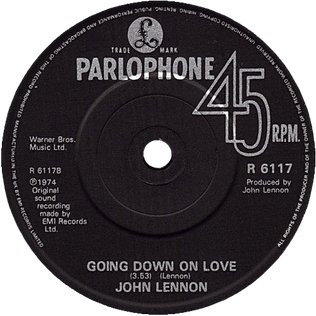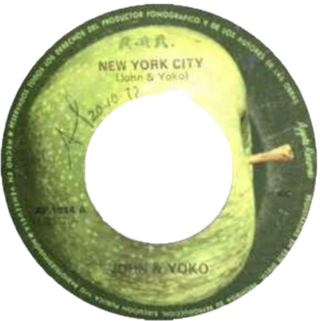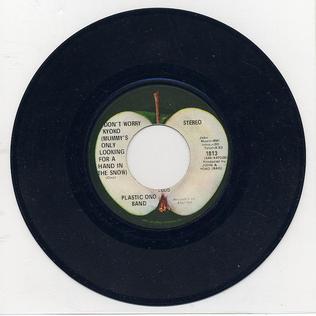Related Research Articles
"Surprise, Surprise " is a song written by John Lennon that was first released on his 1974 album Walls and Bridges. Elton John contributes harmony vocals to the song.
"Well Well Well" is a song by English musician John Lennon from his 1970 album John Lennon/Plastic Ono Band. The eighth and longest track on the album, "Well Well Well" features an aggressive guitar sound, screaming vocals and a pounding backing track.

"My Mummy's Dead" is the closing song on the album John Lennon/Plastic Ono Band by John Lennon. The song was also released on a Mexican EP that also contained "Mother", "Isolation" and "Look at Me".

"Going Down on Love" is a song by John Lennon, released as the first track on his 1974 album Walls and Bridges. It was also released as the B-side of Lennon's "Jealous Guy" single in 1985.
"Old Dirt Road" is a song written by John Lennon and Harry Nilsson, first released on Lennon's 1974 album Walls and Bridges. Nilsson later recorded the song on his 1980 album Flash Harry.

"I'm Losing You" is a song written by John Lennon and released on his 1980 album Double Fantasy. It was written in Bermuda in June 1980, after several attempts by Lennon to call his wife, Yoko Ono, who remained in New York. The song is also available on the 1982 compilation The John Lennon Collection, the 1998 boxset John Lennon Anthology, the one disc compilation Wonsaponatime, the 2005 two disc compilation Working Class Hero: The Definitive Lennon and in 2010 for the Gimme Some Truth album. The song was also featured in the 2005 musical Lennon.
"Aisumasen (I'm Sorry)" is a song written by John Lennon released on his 1973 album Mind Games. The song is included on the 1990 box set Lennon.
"Out the Blue" is a song written by John Lennon and originally released on his 1973 album Mind Games. The song is included on the 1990 boxset Lennon, the 2005 two-disc compilation Working Class Hero: The Definitive Lennon, the 2010 album Gimme Some Truth and the 2020 compilation album Gimme Some Truth. The Ultimate Mixes.
"I Know (I Know)" is a song written by John Lennon released on his 1973 album Mind Games. The song is included on the 1998 box set John Lennon Anthology and the 2020 compilation album Gimme Some Truth. The Ultimate Mixes.

"Sisters, O Sisters", also known as "Sisters O Sisters", is a song written by Yoko Ono that first appeared on John Lennon's and Yoko Ono's 1972 Plastic Ono Band album Some Time in New York City, backed by Elephant's Memory. It was also released as the b-side to the couple's "Woman Is the Nigger of the World" single. It has been covered by a number of artists, including Le Tigre and Tater Totz.
"The Luck of the Irish" is a song written by John Lennon and Yoko Ono that was first released on the couple's 1972 Plastic Ono Band album with Elephant's Memory, Some Time in New York City. It was written in late 1971 and was performed by Lennon and Ono live at several protest rallies and television appearances before being released on the album. It had been slated to be the first single from Some Time in New York City backed by "Attica State" but the release was shelved in favor of "Woman Is the Nigger of the World". A live acoustic performance was released on several John Lennon compilation albums.
"Born in a Prison" is a song written by Yoko Ono and first released on her 1972 album with John Lennon Some Time in New York City as part of their Plastic Ono Band project.

"New York City" is a song written by John Lennon that was first released on Lennon's and Yoko Ono's 1972 Plastic Ono Band album Some Time in New York City.

"What You Got" is a song written by John Lennon that was first released on his 1974 album Walls and Bridges. It was later released as the B-side to his top 10 "#9 Dream" single.
"Bless You" is a song written by John Lennon that was first released on his 1974 album Walls and Bridges. It is a ballad expressing his love for his wife Yoko Ono, from whom he was separated at the time. Alternative versions appeared on the compilation albums Menlove Ave. and John Lennon Anthology.
"Scared" is a song written by John Lennon that was first released on his 1974 album Walls and Bridges. Alternate versions were subsequently released on the compilation albums Menlove Ave. and John Lennon Anthology.

"Don't Worry Kyoko (Mummy's Only Looking for A Hand in the Snow)" is a song by Yoko Ono that was originally released by Plastic Ono Band in October 1969 as the B-side of the "Cold Turkey" single, and was later released on Ono's 1971 album Fly. Several live versions have been released, including on Plastic Ono Band's Live Peace in Toronto 1969 and the John & Yoko/Plastic Ono Band With Elephant's Memory album Some Time in New York City in 1972. An early version was titled "Mum's Only Looking for Her Hand in the Snow". It has been covered by several other artists.

"Move Over Ms. L" is a song written by John Lennon. It was originally intended to be released on his 1974 album Walls and Bridges but was left off shortly before the album release, and was eventually released as the b-side to Lennon's "Stand by Me" single. In the interim it was released by Keith Moon on his album Two Sides of the Moon. Moon also released it as the B-side of his "Solid Gold" single.
"Sunday Bloody Sunday" is a song written by John Lennon and Yoko Ono that was first released on their 1972 Plastic Ono Band album with Elephant's Memory, Some Time in New York City. The song addresses the Bloody Sunday massacre of 1972 and is one of two on the album that addresses the contemporary Northern Ireland conflict, "The Luck of the Irish" being the other.

"Beef Jerky" is an instrumental written by John Lennon that was released on his 1974 album Walls and Bridges and also as the b-side of the lead single from that album, the #1 hit "Whatever Gets You thru the Night."
References
- 1 2 3 4 5 6 7 Blaney, J. (2007). Lennon and McCartney: together alone : a critical discography of their solo work. Jawbone Press. pp. 95–96. ISBN 9781906002022.
- 1 2 3 4 5 Madinger, C. & Easter, M. (2000). Eight Arms to Hold You. 44.1 Productions. p. 102. ISBN 0-615-11724-4.
- 1 2 3 4 5 6 Jackson, A.G. (2012). Still the Greatest: The Essential Solo Beatles Songs. Scarecrow Press. pp. 124–126. ISBN 9780810882225.
- 1 2 3 4 5 6 7 Rogan, J. (1997). The Complete Guide to the Music of John Lennon. Omnius Press. pp. 92–93, 144. ISBN 0711955999.
- 1 2 3 4 5 6 7 8 Urish, B.; Bielen, K. (2007). The Words and Music of John Lennon. Praeger. pp. 61–62, 97–98. ISBN 978-0-275-99180-7.
- 1 2 3 4 5 du Noyer, P. (1999). John Lennon: Whatever Gets You Through the Night. Thunder's Mouth Press. p. 94. ISBN 1560252103.
- ↑ Nelson, Jimmy (26 September 2019). "John Lennon, "Nobody Loves You [When You're Down and Out]" (1974): Deep Cuts". Something Else!. Retrieved 4 May 2023.
- ↑ Rodriguez, R. (2010). Fab Four FAQ 2.0: The Beatles' Solo Years 1970–1980. Hal Leonard. p. 82. ISBN 978-0-87930-968-8.
- ↑ DeRiso, Nick (5 June 2021). "Underrated John Lennon: The Most Overlooked Song from Each LP". Ultimate Classic Rock. Retrieved 3 January 2023.
- ↑ Coffman, Tim (22 January 2024). "10 greatest John Lennon deep cuts". Far Out. Retrieved 24 January 2024.